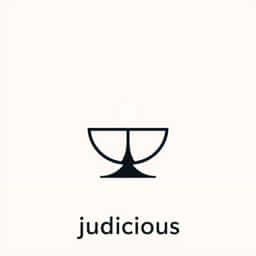In everyday conversation or formal writing, the accuracy of word usage significantly impacts how messages are conveyed. One such word that often raises questions is judicious. Many English learners and even fluent speakers wonder whether this term is a verb, and how it should be properly used in a sentence. Understanding the part of speech of judicious helps improve grammatical precision and writing clarity. By exploring its usage, meaning, and contextual applications, we gain a better appreciation for how English works at a structural level.
Understanding the Word Judicious
Definition of Judicious
Judicious is an adjective, not a verb. It describes someone or something that shows good judgment, wisdom, or sound decision-making. The word is typically used to characterize actions, people, or decisions that reflect careful consideration and practicality.
- Example: She made ajudiciouschoice to invest in education rather than short-term luxury.
- Example: Hisjudicioususe of resources saved the company from financial trouble.
In these sentences, the word modifies a noun, as adjectives typically do, which clearly places it in the adjective category.
Etymology and Roots
The word ‘judicious’ comes from the Latin wordjudicium, meaning judgment. It entered English through the French termjudicieux, carrying the same meaning. Its roots are deeply tied to the act of judging or discerning wisely, which helps explain why the word has no active or dynamic verb form itself.
What Is a Verb?
Basic Characteristics of Verbs
Verbs are action words or words that describe a state of being. They are essential components of a sentence because they indicate what the subject does or experiences. Examples of verbs include:
- Run
- Think
- Become
- Decide
Verbs can also be modified for tense, voice, and mood, such as run, ran, or running. If a word cannot be used in these variations, it is not considered a verb.
Can Judicious Be Used as a Verb?
No, judicious cannot be used as a verb. There is no verb form of judicious. You cannot say someone is judiciousing or that someone judicioused a decision. Those forms are grammatically incorrect and do not exist in standard English usage.
Correct Grammatical Usage of Judicious
How to Use Judicious in a Sentence
Since it is an adjective, judicious should be placed near the noun it describes. It is often used in both professional and casual writing to imply wisdom or strategic thought. Below are some sample sentence structures that correctly use the word:
- They adopted ajudiciousstrategy for managing risk.
- Her comments werejudiciousand well-reasoned.
- The manager gavejudiciousfeedback during the performance review.
Alternative Verb Forms with Similar Meaning
Although judicious itself is not a verb, there are several verbs that convey a similar idea of exercising judgment or making wise decisions. These include:
- Judge– To form an opinion or conclusion.
- Consider– To think carefully about something.
- Evaluate– To assess or examine thoroughly.
- Discern– To recognize or identify clearly and wisely.
Example: She carefullyevaluatedall her options before deciding.
Example: Hejudgedthe situation and acted accordingly.
Common Misunderstandings in English Grammar
Why the Confusion Happens
The confusion over whether judicious is a verb may come from the similarity in form with actual verbs like judge or adjudicate. Learners may assume that because judicious relates to judgment, it should also function as a verb. However, English often retains related words in different grammatical categories.
Other Adjectives Mistaken for Verbs
English learners often mistake other adjectives for verbs. Here are a few similar examples:
- Generous– Not a verb, but related to the verb give.
- Curious– Not a verb, but related to inquire or wonder.
- Cautious– Not a verb, but associated with avoid or watch.
Enhancing Your Vocabulary with Related Terms
Adjectives Similar to Judicious
If you want to enrich your vocabulary while keeping the same tone of meaning, consider the following synonyms for judicious. Each can be used in a similar context:
- Prudent– Showing care and thought for the future.
- Wise– Possessing or showing good judgment.
- Sensible– Chosen in accordance with wisdom or prudence.
- Discerning– Having or showing good judgment.
Using Judicious in Professional Settings
Judicious is especially popular in professional, academic, or formal settings. It conveys a tone of thoughtfulness and is often used when describing actions that require deliberate planning or careful assessment. Examples include:
- Ajudiciousapproach to policy making
- Judiciousspending of public funds
- Judiciousediting in publishing
Clarity in Word Use
Understanding the role of judicious in grammar helps prevent misuse and enhances communication skills. As a descriptive adjective, it plays a key role in enhancing sentence quality and conveying thoughtful decision-making. It cannot function as a verb, but its value lies in its ability to define decisions, behavior, and plans as wise or sensible.
By recognizing that judicious is not a verb, English learners and writers can focus on using it effectively to describe people, choices, and strategies. Instead of attempting to convert it into a verb form, one can pair it with appropriate verbs such as make, take, or offer to build accurate and expressive sentences. The more one becomes familiar with the correct grammatical category of words like judicious, the clearer and more impactful one’s language will become.
